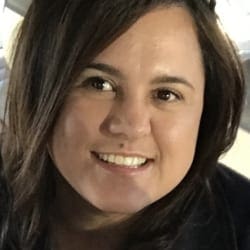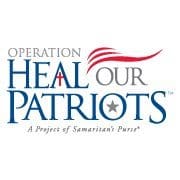Being a veteran caregiver has given me a sense of strong sympathy for others, and a voice for those who are the minority.
What are you most excited to do as a Dole Caregiver Fellow?
What excites me the most about being a Dole Fellow is to support the Hispanic Community. There is a lack of information for Spanish speaking caregivers. It is a struggle to find good services, benefits, and programs for veterans due to language barriers. Another cause close to my heart is the mental health and well being of military kids.
At what moment did you realize you were a military caregiver?
I realized that I was a military caregiver when I actually met other caregivers in our same situation. My husband was in inpatient treatment due to a suicide attempt and after his discharge, his case manager gave us some resources for support. Thanks to Wounded Warrior Project, we met who is now my mentor, my best friend, and a fellow caregiver.
How has your life changed since you became a caregiver? What sacrifices have you had to make?
There are so many changes, both positive and negative, since I became a caregiver. I had to stop my personal and professional goals and leave my job to become my husband’s caregiver 24/7. Also, I have had to leave my kids with relatives, so I can care for my husband, and have missed several of their milestones. On the positive side, I have found new and more exciting goals, changed my perspective of my self-worth, realizing how strong I can be to find answers and to be a source to others. Most importantly for me, I became a role model to my kids. They see a mom that does not give up and they have become supporters to other veterans’ kids.

My Story
Silvia Lopez’s husband, Alex, is a proud veteran who served as a mortuary affairs specialist in the U.S. Army and Reserves for 15 years. He was deployed around the world to assist in recovering the remains and personal effects of fallen service members. As a result of his years of service Alex suffers from post traumatic stress disorder (PTSD), a traumatic brain injury (TBI), depression, agoraphobia, Meniere’s disease, and skin conditions due to exposure to chemicals while processing remains.
Silvia took on the role of Alex’s caregiver. She cleans his damaged skin, helps him dress and shower, prepares his meals according to his special dietary requirements, supports him at his doctors’ appointments, and keeps him on track with his regimen of medication. She also looks out for Alex’s triggers, which include hearing the playing of TAPS in movies, television, or ceremonies; a reminder of a part of his work, presenting flags to Gold Star families. In these dark moments, the flashbacks from his service, Silvia is the only one who can save Alex. “The feeling of my hand somehow reaches him,” says Silvia. “It lets him know that he is safe and loved.”
It has not been an easy journey for Silvia. When she first became a caregiver and started to accompany Alex to doctors’ appointments, she struggled to understand some of the medical terms. Oftentimes materials were only available in English, which was difficult because her primary language is Spanish.
In addition to caring for Alex, Silvia takes care of their five children and one grandchild. Each of them felt the impact of their father’s invisible injuries, but they have each stepped up to help. Alex’s mother has also been an incredible support to the family, taking care of the household when Alex had long treatments. Their oldest child, Annie, takes Alex to his doctor’s appointments. Their 10-year-old, Zianny, likes to be the nurse. All their children, including six-year old Sarybeth, help soothe their dad’s mood, and 14-year-old Paula keeps the little ones occupied and calm when their dad is struggling through an emotional episode. Thanks to the help of her children, Silvia has earned her degree in military resilience to help her grow and learn, and better help her husband.
For her first five years caring for Alex, Silvia did not recognize herself as a caregiver. It was only when she attended an event with others like her that she realized she was acting as more than Alex’s wife. Since then, she has helped others identify themselves as caregivers and get help through her work with Warrior Community Connect, as a community navigator with AmeriCorps, and as the Support Facilitator for American Red Cross Military Veteran Caregiver Network of Puerto Rico. She plans to continue her advocacy, especially in the Latino community. The VA and many other organizations do not have materials in Spanish, and she feels it is vital that she speak up to help change the system to better include those like her.









